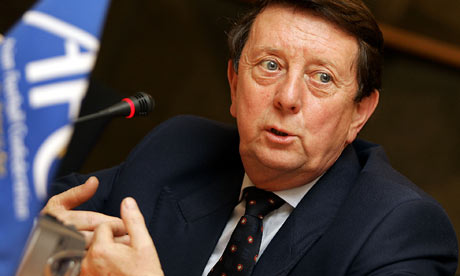
England's troubled bid to host the 2018 World Cup was thrown into fresh turmoil todayby the abrupt resignation of the Premier League chairman, Sir Dave Richards, from the board, highlighting a bitter power struggle at the heart of the game. Less than a fortnight ago, the Premier League promised its "wholehearted support" for England's bid to host the World Cup for the first time since 1966, after the FA and bid chairman, Lord Triesman, had tried to quell ongoing infighting by drastically overhauling his board.
But yesterday Richards quit the restructured board after concluding he could no longer work with Triesman, in a development that again lays bare the dysfunctional relationship between the men in suits who run English football. Richards' bombshell could have severe ramifications for the bid and as one senior football insider said last night: "The score is egos 4, the bid 0."
The move leaves the position of Triesman, who has been attacked repeatedly over his leadership skills, under renewed pressure. Critics say the bid lacks a uniting figure able to play the role that Sebastian Coe – who also sits on the 2018 board – held for London in the 2012 Olympic race.
The high-profile defection of the man who was meant to be masterminding strategy, just two days before 16 prospective host cities were due to deliver their bids, will further frustrate those on the 2018 team already annoyed at the board's inability to put personal battles aside. Next week, they head for South Africa. Accompanied by "bid ambassadors" including David Beckham and Osvaldo Ardiles, it was hoped the trip, at which they will come face to face with rival bidders, would reinvigorate the campaign. By moving the focus away from the suits in the boardroom and towards the stars on and off the pitch – others with key roles include premiership players, Prince William and Gary Lineker – the executive team had hoped to escape the damaging internal rows that have dogged the bid.
To date, the local political difficulties have yet to seriously damage the bid's chances of wooing the 24 members of the Fifa executive committee who will decide its fate in December next year. But yesterday's news is likely to ripple around the world, particularly ahead of next week's trip. Criticism from the controversial Fifa vice-president Jack Warner and a furore over the gifts of £230 Mulberry handbags for the wives of the 24 Fifa executive committee members has already had rival bidders such as Spain/Portugal, the US, Australia and Russia rubbing their hands
In a statement, Richards vowed to continue working to win the bid: "I feel I can now best support a successful bid without the necessity of sitting on the board.
"My positions as Premier League chairman, FA board member and chairman of the FA's international committee provide me with ample opportunities to bang the drum for English football, and the bid particularly … which I will continue to do wherever and whenever I can. "
The sports minister, Gerry Sutcliffe, one of six board members who stepped down in a reshuffle this month, said he was "sad and disappointed" at the resignation. As part of the reshuffle six other board members, including Sutcliffe and Sir Martin Sorrell, were shifted to an advisory panel to be led by the former Birmingham City managing director Karren Brady.
Ironically, the latest schism was partly prompted by an attempt to solve one of the major criticisms of the campaign: that it lacks a defining message. To address that, Triesman appointed the combative outgoing communications director at Chelsea, Simon Greenberg, as chief of staff.
For Richards, the fact Triesman had not consulted him convinced him he could not work with the FA chairman. The enmity goes back to the earliest days of Triesman's reign at the FA. Shortly after his appointment in December 2007 as the FA's first independent chairman, Triesman made it clear he thought the game's "prune juice" economics were unsustainable and set his stall out as a reforming figure.
The former Labour party general secretary helped kill off the "39th game" plan and, in an incendiary speech, warned of "debt mountains" in English football. That provoked a furious Premiership response and when Triesman came to build his team, he faced criticism for omitting not only Richards but Geoff Thompson, his predecessor as FA chairman who sits on the Fifa executive committee.
After the arrival of Andy Anson, the former Manchester United commercial director as bid chief executive, building bridges with the Premier League became a priority. Richards was brought onto the main board in March and sought to make the Premier League's appeal around the world, and the profile of its overseas stars, a key plank. But tensions remained.
Anson yesterday insisted Richards' decision would not hurt the bid and it was "not an issue about the Premier League", which remained committed to the bid.
"There is so much that is good going on at the moment with the host city submissions this week and David Beckham supporting us in South Africa next week. We have the support of fans across the country and we firmly believe we have the credentials."
He pointed to the presence in Kuala Lumpur of the Premier League chief executive, Richard Scudamore, and the Manchester United chief executive, David Gill, who also left the main board in the recent reshuffle, as evidence of support. The pair are advising the Asian Football Confederation, and lobbying for the 2018 bid.
Vicious briefing from rival campaigns and a sense of inertia at the heart of the England bid allowed the growing perception it was being hobbled from within. A dispute with the government over whether or not it promised to fund the bid to the tune of £5m was allowed to snowball into a major row. Now, as the bid enters its critical phase, the latest could hardly be more ill-timed.

